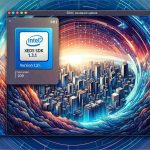In a strategic bid to reshape its approach to artificial intelligence (AI), Apple has joined forces with Broadcom to develop a new AI server chip. This innovative chip, code-named “Baltra,” is slated for mass production by 2026. Apple’s decision marks a significant shift away from its dependence on Nvidia’s processors, aiming to fortify its AI capabilities.
Revolutionizing AI with Broadcom
Apple’s collaboration with Broadcom positions it alongside other tech giants like Google, who are also creating customized chips to enhance their AI services. By working with Broadcom, Apple intends to cut down reliance on Nvidia’s costly and often limited supply of processors. This venture employs Taiwan Semiconductor Manufacturing Co’s advanced N3P fabrication process, promising efficiency and improved performance.
Apple and Broadcom: A Growing Partnership
The alliance between Apple and Broadcom isn’t novel; the two companies previously collaborated on developing 5G radio frequency components. Despite Broadcom’s shares rising by five percent following this announcement, the company’s stock has already seen a considerable increase driven by the AI boom, experiencing a 54 percent surge in 2024 alone.
Challenging the AI Chip Market
By investing in its own server chips, Apple seeks to enhance AI features across its devices, a move highlighted at its Worldwide Developers Conference earlier. Although Apple’s M-series chips have successfully replaced Intel chips in Macs, breaking completely from Nvidia’s hold in the AI sector remains challenging. Broadcom stands ready to compete with leading firms like Marvell in the custom chip market, which could expand to $45 billion by 2028.
Apple-Broadcom Alliance: The Game-Changer in AI Technology
In an era of rapidly advancing technology, Apple is taking bold steps to redefine its artificial intelligence (AI) strategy. Teaming up with Broadcom, Apple is on the path to create an innovative AI server chip, code-named “Baltra,” which aims to be a cornerstone of its AI infrastructure by the year 2026. This partnership not only signifies a strategic pivot away from reliance on Nvidia processors but also underscores Apple’s ambition to solidify its leadership in AI capabilities.
The Impact of Apple’s New AI Chip
The development of the “Baltra” AI server chip is slated to bring a transformational shift to Apple’s AI ecosystem. By leveraging the advanced N3P fabrication process from Taiwan Semiconductor Manufacturing Co., Apple promises increased efficiency and enhanced performance. This move is expected to allow Apple to fine-tune AI capabilities across its diverse product line, aligning with its broader vision to integrate AI more intimately within its technology offerings.
Accelerating AI Progress: Advantages of the Apple-Broadcom Partnership
The collaboration with Broadcom marks yet another milestone in Apple’s journey to cultivate technological prowess and innovation. Previously, their partnership flourished in the development of 5G radio frequency components. Broadcom’s five percent stock rise following this news evidences the market’s confidence in this collaboration. More notably, Broadcom experienced a substantial 54 percent surge in AI-driven market demand in 2024 alone, highlighting the potential of this alliance to impact the tech landscape profoundly.
Competing in the AI Chip Sector: Opportunities and Challenges
By developing its server chips, Apple is venturing into a highly competitive market that demands innovation and strategic foresight. Apple’s move follows its successful transition from Intel to M-series chips in Macs, aiming now to loosen Nvidia’s grip on the AI chip sector. However, companies like Marvell remain formidable competitors in a booming market that could grow to $45 billion by 2028. Apple and Broadcom’s partnership represents a significant attempt to capture a substantial stake in this lucrative industry.
Future Trends and Market Predictions
Looking ahead, Apple’s investment in AI chip development signifies a broader trend of tech giants moving toward self-reliance and bespoke technology solutions. As companies strive for efficiency and superior performance, the demand for customized AI chips is expected to rise. This trend is likely to catalyze further innovations and collaborations in the tech sector, setting the stage for substantial advancements in AI applications by the end of the decade.
By aligning its strategy with such forward-thinking innovations, Apple remains poised to maintain its competitive edge and reshape the AI chip landscape in the years to come. For more details and updates on Apple’s latest ventures, visit the official Apple website.



















